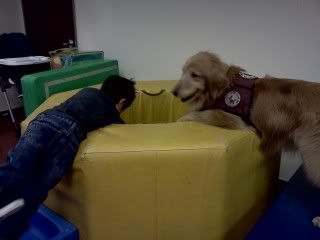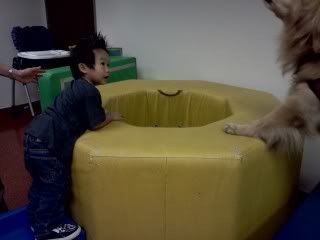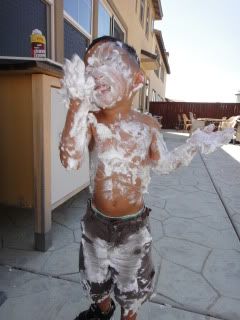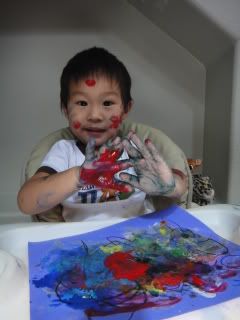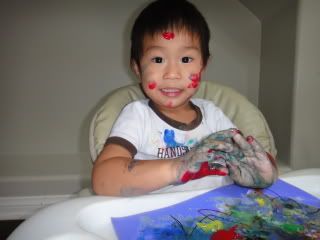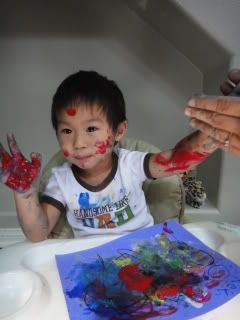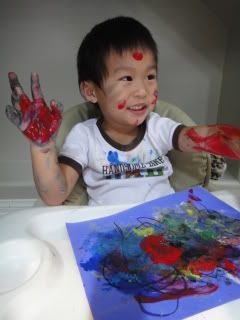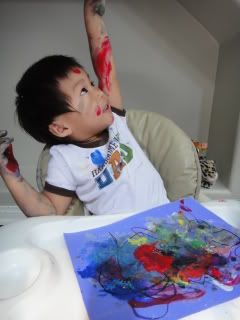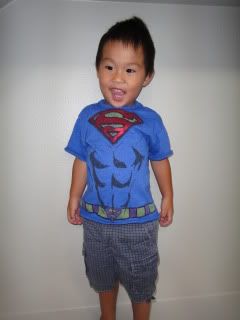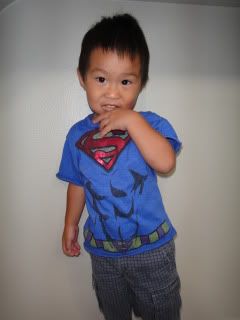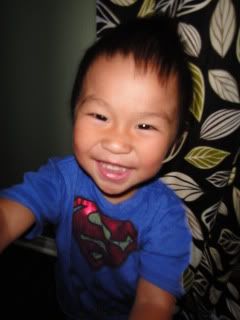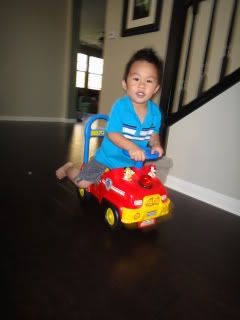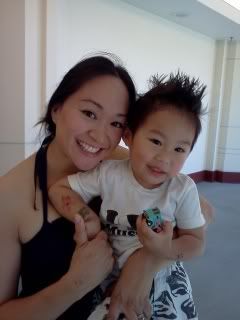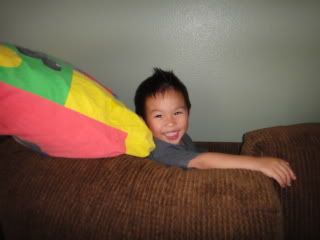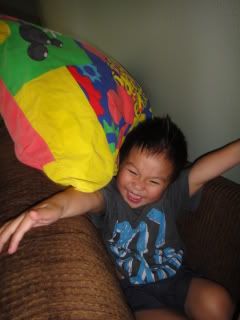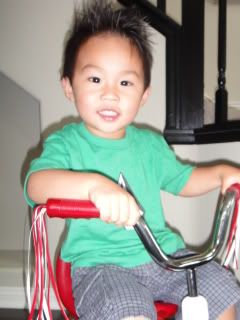Being diagnosed with CAS, many people have asked me, "How did you get that diagnosis?" or "How did you even come to think that something could be wrong since he's so young?"
Here's how it began.
As an infant, Koa never really babbled. We got the occasional coo, the sometime here and there squeal, but no real different sounds babbling. And now that I have Malia who is 14 months younger, I saw that in her. But with Koa, I never saw it, nor did I think anything of it.
Right around his 1st birthday Koa said his first word, "Mama" which was then quickly followed with "Dada". We were thrilled. Finally! His first word! But we never heard it again. Both times, they were isolated incidents in which they were quick outbursts. We never thought, was it said with purpose? We were just happy that we heard sounds out of him. At around 13 months he said one more word "Kracka" for "Cracker." At 14 months, the word "La Na" for "Wala Na" a Filipino word for "No more." Both those words were also isolated and never heard again.
At 15 months we voiced our concerns to our pediatrician that those words came and went yet we never heard them again. During play, Koa was as quiet as could be. He was a happy and energetic boy, but very quiet. When he did make noise, they were mostly laughs, giggles and squeals. Nothing discerning into vocabulary. We were told to keep an eye on it and that we would re-evaluate him at the age of 18 months.
Everyone kept telling me, "He's so young. Give him time, he'll eventually just start talking" Or, "My son didn't talk till he was almost 2. Boys are always slow." I got everything under the spectrum as to why he wasn't talking. But something in my heart AND head told me something wasn't right. I knew he was young and would still have time to hit this milestone. But yet, I JUST KNEW that there was something about Kekoa that gave me lots to worry about. Call it motherly instinct. Or even point out the fact that I was once an early childhood educator. But no matter what, I knew that somewhere in his development, something was not right.
18 months came and went and at that point we were told by our pediatrician that he should have at least 40 words in his repertoire. Koa had 0. None, not one word that we could clearly define, not one word that we knew had any meaning. He suggested that we get him evaluated with our local Regional Center with their Early Intervention Program, even throwing out the dreaded "A" word... Autism.
I called and called, researched and researched, yet I got nowhere. Thanks to Kira, my best friend and family cousin, who works as an Autistic behavioral specialist in Sacramento, she got me in touch with Riverside County's Regional Center who then did a quick over the phone evaluation. Needless to say, Kekoa passed/ failed. Meaning, there were enough things in there to be concerned about to have him further evaluated for the scary diagnosis of Autism.
Prior to the second evaluation, I began living this nightmare coming true. I looked up Autism Speaks' website and started watching videos of children with Autism Spectrum disorder and thought, "This is my little boy." I cried each night and thought, "If he's Autistic we'll do everything we can to help him immediately. If we can't get him to come into our world, then we're certainly doing what we can to get into his!" We received such an outpouring of love and support from family it was amazing.
On the day of the evaluation Kekoa, non-surprisingly, threw everyone for a HUGE loop. All of the things we said that Koa couldn't do, he did just fine and on cue. All of the things we said that he did, he didn't display (such as no eye contact, not responding to his name on prompt). In fact, they even brought in 3, yes THREE total doctors and psychologists to have him evaluated. Koa was clearly NOT Autistic. But he was VERY behind in terms of meeting his language milestones. He was evaluated for his receptive skills (understanding language) being at 12 months, and his expressive skills (speaking language) being at 5 months. Kekoa, 20 months old at the time was more that 50% delayed. Thus putting him in Early Intervention as being developmentally delayed. We were given twice weekly services with a teacher to work on this, but recommended we see a Speech Pathologist who could further evaluate him.
The good news was, Yes, Kekoa was not Autistic. But the bad news was, we still did not have any answers. Yes, he was non-verbal and it was a problem. We knew that already! But what was wrong with him?!
We took him to see one Speech Pathologist, who from the get-go rubbed me the wrong way. First, she didn't shake our hands or introduce herself to Kekoa. In fact she just led us to her office. Secondly as she was evaluating him, we let Koa eat some apple slices. As he was eating, she stopped writing, looked up at him and said rather rudely, "Does he ALWAYS jam food like that into his mouth?!" Not knowing why she asked that (now knowing NOW that it is VERY common for children with Apraxia to have Oral Sensory issues... food jamming being one of them) I answered defensively, "Not all the time. Just when he likes the food." She then finished her evaluation and said, "Well, I'll have to run this by my manager, but it looks to me your child has Apraxia." Apraxia?? What was that? I've never heard of it. I asked her to explain it a little bit more to me, to which she just handed me a card with the National Apraxia Association website and ushered us out of her office. We never went back to her again.
That night I went onto the website and saw the following:
In typical speech/language development, the child's receptive and expressive skills increase together to a large extent. What is often seen in a child with apraxia of speech is a wide gap between their receptive language abilities and expressive abilities. In other words, the child's ability to understand language (receptive ability) is broadly within normal limits, but his or her expressive speech is seriously deficient, absent, or severely unclear.It was clear. Kekoa's cognitive skills were right at par with his age. He clearly understood our questions, our commands, and would respond somehow by shaking his head, staring at us as his way of saying yes, or even point to things when helpful. Luckily we also had begun using sign language with Koa, to which he caught on really quickly. And it was a huge help in lessening his frustration and getting to know what it was he wanted or was trying to tell us.
As I read on, my heart sank further and further and I became that much more saddened by this possible diagnosis. Would my child EVER speak? Would I ever know what it was he wanted to tell me? Most importantly,
would I ever be able to talk to my son? Sure signing was helping, but would I ever hear his voice? From the day he was born I dreamed of the day he would call me Mama, and regularly too. I wondered, would this even be possible for him?
I researched other Speech Pathologists in our area and found our dream come true, our savior... Lucid Speech and Language. A center of Speech Pathologists who concentrated with just children and speech disorders associated with Autism and Apraxia. We made an appointment.
Upon first evaluation, it was clear, Kekoa was showing the signs of Apraxia. However, not quite 2 at the time, (he was only 21 months old by this time) they said they would start early intervention speech therapy with him but most likely wouldn't be able to officially diagnose him till he turned 2 as milestones were to still be emerging.
We had a wonderful therapist who first started with Koa, Mrs. Cynthia Sandoval, who then diagnosed Kekoa at the age of 2 years and 2 months with "Moderate to Severe Childhood Apraxia of Speech with an expressive language disorder considered secondary to his diagnosis of Apraxia, also with a mild receptive disorder."
Through therapy, using the Kaufman method, we were told that Kekoa would be starting from ground zero. Meaning, we would be starting right where Malia was almost... getting him to have an increase in babbling, working on sounds, such as animal sounds... pretty much use those as building blocks to form words.
Its not an easy task, but so far Kekoa is handling all with his own style and flair. :)
Kekoa at 8 months
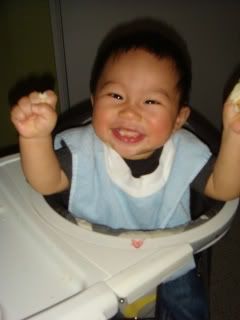
Kekoa at 20 months, 1 week prior to his Regional Center diagnosis of Non-Autism

